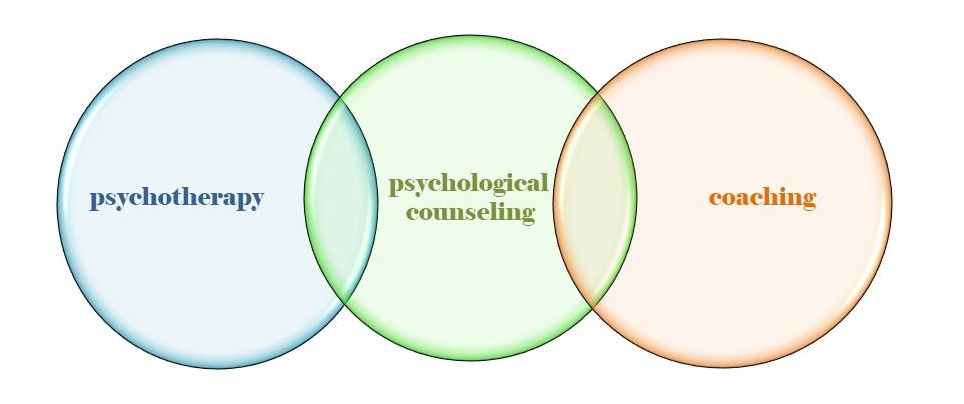
With whom to talk and work?
Should I talk to a psychotherapist, a counseling psychologist or a coach?

health and their interaction
One of the first topics that I am addressing with my clients in our discovery session is which are their needs regarding their mental and emotional health, where they are on their path, what do they want and desire from working with a professional, what are their goals, objectives and intentions for the future and where they find themselves in different domains of their life.
Why do we do this? one might ask.
Because most of us, we are not educated about what each professional does and what needs they can cover for us!
(Can you keep a secret? Even for us, professionals it is sometimes hard to understand where one ends and the other one starts and we can easily think that one is more important than the other, while there is so much space for collaboration and integration of these approaches to mental and emotional health!)
For the next minutes, I will try to support you in having a better and clearer picture of this topic. I will be focusing on the bigger picture and the main differences, but also similarities of each specialization. Going into details would require a very long article. However, I am doing my best to give you in a simple way, without losing important details, this first step into answering the question: with whom I should work?
The ultimate mission and purpose of psychotherapy, psychological counseling and coaching is to help, support and guide people in living a healthier, fuller and more satisfying life. The differences between the three are given by their different approach to health, different tools/methods used, different ways of looking at health and health problems. Even more, for each specialization, there are different approaches one can take in viewing the mechanisms behind our health problems, the explanation of the causes and the development of our health problems, and the different tools/methods used to help us recover. I will give some examples for each below.
Furthermore, one profession doesn’t exclude or compete with the other! They actually overlap at a certain extent and can also be combined. You can work with let’s say first a psychotherapist and
Very important to mention is that our health is dynamic and it is not so helpful if we talk only in terms of “healthy vs. unhealthy” and we don’t see that there is much more that we can address in talking about health. Of course, it helps us to understand better having some boxes, but life is dynamic. For example, unhealthy behavior can be very helpful for someone in a specific environment. This doesn’t make it healthy, but it serves a specific purpose. And maybe it is useful at a specific time, but not at a later time. Or it is deemed unhealthy in one culture and healthy in another. And the list can go on.
Now, coming back to our main objective: what each professional offers?
PSYCHOTHERAPY
Psychotherapy or clinical psychology in the course of its development has taken more of a psychopathology approach focusing on diagnosis and abnormal functioning. Many times, a psychotherapist/clinical psychologist will work with people suffering from mental and emotional dis-ease that is more severe and that is affecting most areas of life (work, career, relationships
The approach on working with the one’s
There are several approaches to psychotherapy, including cognitive-behavioral, interpersonal and psychodynamic, systemic therapy (and many more).
When considering a professional to work with, ask them about their approach and ask them to explain it to you until you understand.
Being a psychotherapist requires formal education and certification and many years of practice and supervision and it is highly regulated in most countries. The base education is in psychology and they specialize in a specific approach (the ones I mentioned earlier; for example, CBT- Cognitive-Based Therapy, ACT- Acceptance and Commitment Therapy, EFT – Emotionally Focused Therapy
One big myth about psychotherapy is that it only focuses on the past and you only talk about the relationship with your parents, and while that it is true to a certain extent (let’s be honest, we learn so much from the primary caregivers and they represent our first “universe”, of course, it deserves attention), this is not the case of all therapies and at all times! The big focus is your present and your future!
PSYCHOLOGICAL COUNSELING
The difference between psychological counseling and psychotherapy is not very big. Counseling psychologists studied psychology and the mechanisms of our minds and mental problems and difficulties. They followed formal training in different therapy approaches, worked under
Counseling psychology uses a broad range of practices that help people improve their well-being, alleviate distress and maladjustment, resolve crises, and increase their ability to live more highly functioning lives. Counseling psychology pays attention both to normal developmental issues and to problems associated with physical, emotional, and mental disorders.
They integrate the latest theory and research with practice and they pay attention to multicultural issues. They help you move from feeling not good or having areas of your life that are dysfunctional, to a great life, fuller of strength and resources.
As in psychotherapy, there are different approaches a counseling psychologist is specialized in (CBT, ACT, etc.) and
COACHING
Coaching is a process that encourages one to reflect and gain awareness of who she/he is, what is important to her/him, strengths, challenges, options open and what action to take in order to make the changes he/she wants in their work or life. Coaching focuses on helping the coachee to take responsibility for identifying their own goals, assessing their own strengths and areas for development and identifying their own solutions for moving forward.
Coaching is much more oriented to individuals that have a good life, but they want something different. The International Coaching Federation (ICF) defines coaching as ‘Partnering with clients in a thought-provoking and creative process that inspires them to maximize their personal and professional potential’. It is much more oriented for thriving in one’s life!
Many coaches follow a certification program where they learn different tools and competencies that a good coach needs for supporting others and understanding their growth process. There are different approaches in coaching as well, with different tools and methods used (for example, cognitive-based coaching, systemic coaching, goal-oriented coaching, coaching for transformation with its root in gestalt therapy, positive psychology coaching
Very broadly speaking, a psychotherapist can help you when dealing with dis-ease, a counseling psychologist when you have some difficulties and a coach when you want to thrive in your life. Each professional can have a different approach and different competencies!
Hopefully, now it is a bit more clear what each professional can help you with, but what do you need?
If you are in need of serious medical advice, you should make an appointment with a healthcare professional!
- The first step is to make clear for yourself that you will benefit from help and support!
- sure there is still stigma still with asking for support and many of us have a hard time acknowledging that, but the benefits are immense
- If you don’t know which type of help, find some professionals either online or in your area and talk to them!
- They will for sure tell you if they can help you or give you further recommendations. Many professionals don’t charge for the first meeting! Ask as many questions as you can.
- The right match when choosing a professional is important. You need to feel comfortable with a person, so you can open and work with her/him
- If you know and want help and support, but you are not sure if you can afford it, still talk to professionals. Some have payment plans in place, others can offer you different solutions or even help you with your financial difficulties (some coaches do exactly that). Don’t let anything stop you from living the best life you can possibly live!
I am more than sure I haven’t covered all that it is to say, so ask me questions!
It is ok not to know already and it is perfectly amazing that you are taking this step into knowing!!!
If you want to read more, these two sites have a lot more information on the topic: for psychotherapy and psychological counseling go here and for




Congratulations Mara, this is a very good article :)!
🙂 Thank you!